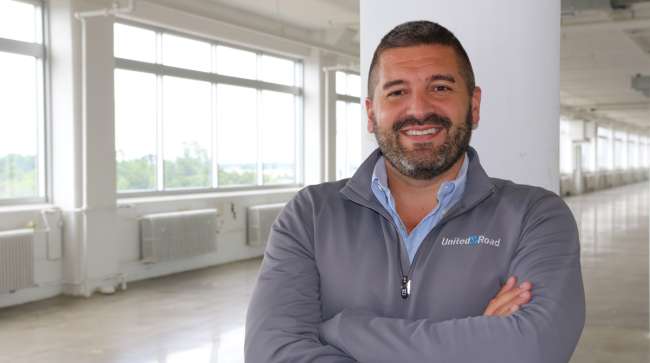“As opportunities arose … I was there to help and solve problems, and that led to where I am today,” Kraft said. (United Road Services)
When Ryan Kraft joined United Road Services in August 2006, he envisioned being with the auto hauler for a long time.
Kraft was named United Road CEO in May.
Asked this week where he imagined himself in 2025 upon joining United Road, he said: “I imagined being here at United Road. This has always been my home.”
“At United Road you choose your own adventure,” Kraft said in an exclusive interview with Transport Topics. “You can be anyone you want to be.”
“As opportunities arose … I was there to help and solve problems, and that led to where I am today,” he said.
Kraft replaces Mark Anderson as United Road CEO.
“The board approved this promotion with the highest level of confidence,” Anderson said. “Ryan has consistently brought vision, integrity and an unwavering drive to deliver results. He understands our business, our customers, and our culture as well as anyone. He is absolutely the right person to lead United Road into its next era.”
United Road ranks No. 1 among North America’s largest auto haulers, TT data show, and No. 60 on the Top 100 list of the largest for-hire carriers in North America.

United Road has been the largest auto hauler in the U.S. for much of the 21st century, and Kraft told TT he intends to make sure that doesn’t change. (United Road Services)
Kraft most recently held the position of chief operating officer for 10 months and before that was chief digital officer. He started out in the finance division and followed that by joining the information technology operations, with projects including developing the company’s transportation management system.
The business was sold to Magnus Technologies. Magnus Technologies CEO Matt Cartwright is United Road’s former chief technology officer.
United Road has been the largest auto hauler in the U.S. for much of the 21st century, and Kraft told TT he intends to make sure that doesn’t change.
Over the next 12 months, Kraft said United Road’s focus will be on execution.
“We have a great team that can handle almost anything,” he said, citing the 2008-2009 financial crisis, the tumult of the COVID-19 pandemic at the start of the current decade, the demise of erstwhile rival Jack Cooper and the tariff-induced turmoil of the past few months.
The auto hauling market is stable, but in a state of flux, he said.
The whole industry stepped up after Jack Cooper went bankrupt, he said, adding that there were still some dominoes to fall in the sector following the rival company’s February demise.
“The chips haven’t all fallen on what’s going to be next for the industry,” he said.
United Road has 1,200 employees, more than 700 independent contractors and operates a national network with 750 company-owned assets. The company was founded in 1997.
The company is headquartered in Plymouth, Mich., which is where Kraft lives with his wife and three sons aged 9, 4 and 2.
Kraft’s parents ran small businesses when he was growing up. Kraft’s father owned a company making tools for original equipment manufacturers while his mother was in the restaurant supply business.
In his free time, Kraft likes to build things. “Working with my hands helps me work through problems. I pretend to be a furniture maker and cabinet maker in my spare time,” he said.

(United Road Services)
One of those enigmas is how to remain flexible and nimble, as well as employee retention.
“Trucking is a very tight margin industry,” Kraft said. “We’re always looking for organic growth and expansion opportunities.”
United Road currently has no acquisitions planned, but is always open to opportunities, he said, adding: “Every good business is always open to opportunities.”
The executive said it is increasingly difficult to find experienced, professional car haulers, although he added bringing new drivers on board was a conundrum the entire trucking market continued to try to solve.
Finding experienced staff is even more acute a problem for auto haulers, he warned, noting the requirements don’t just involve driving the truck, but loading and unloading the truck and trailers as well as dealing with specialist equipment.
“It’s a difficult challenge. It’s getting [to be] a more difficult challenge as the years go on,” he said.
Brian Work of CloneOps.ai discusses where AI agents fit into today’s supply chain workflows and what they might mean for the future of trucking operations. Tune in above or by going to RoadSigns.ttnews.com.
One solution, he said, is continuous investment in people and finding ways for people to become successful. “Carriers must make sure drivers are successful after being trained,” he said.
United Road offers guaranteed wages in the first year and makes sure drivers receive extra attention from the human resources team in the first couple of years working for the company, he added.
Kraft — now the most powerful executive in the auto hauling business — sees two additional problems for the segment.
“[Auto haulers] have to do a better job at educating our customers of what it requires to run a sustainable auto hauling business,” he said, noting that it tends to be a race to the bottom on prices. Auto hauling prices need to reflect the true cost of business, he added.
The other is convincing lawmakers to increase the maximum gross vehicle weight rating.
If Kraft had the power, he would institute an increase in the nationwide GVWR to around 88,000 pounds from 80,000 pounds, he told TT, particularly as auto haulers carry ever more electric vehicles that are 30% to 50% heavier than their internal combustion engine peers.
Electric vehicles decrease the load factor, increase the price per unit and increase the cost to the consumer, Kraft said. “This would not be precedent setting,” he added. A number of segments and states have exemptions for particular carriers.







